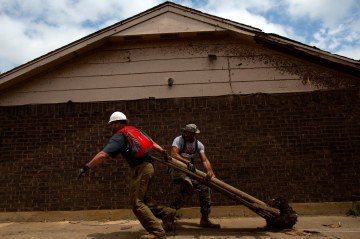
There was absolutely no way Ian Smith was suffering from posttraumatic stress disorder. He was sure of it.
He was O.K. He was living with his girlfriend in a suburb of Nashville working three jobs — mowing lawns, delivering pizzas, cleaning a local church. He was carrying a 4.0 average at Volunteer State Community College. Yes, he’d seen some terrible stuff during two tours in Iraq. But others had been through much worse. He’d never been wounded. He was alive.
But it was a strange sort of alive. He lived on his couch, with his pistol. He didn’t sleep much. The only way he could get to sleep was by getting drunk, so he got drunk every night and slept with his gun under the pillow. He had gained 60 lb. since leaving the Army in February 2009. He drank more and more. His girlfriend left him. He put the gun to his head several times. “He absolutely refused to believe he was suffering from PTSD,” said his buddy Mike Pereira, a fellow Army intelligence analyst. “But I wasn’t going to let him alone.”
Pereira was working for a veterans’ service organization called the Mission Continues, in St. Louis. He heard Ian’s anguish over the phone and over the headset when they played Call of Duty together. Mike had lived through some tough times too after leaving the Army. He too had been living alone, on the couch. He too had put a gun to his head. But he was living with a purpose now. And he kept after Ian to come to St. Louis: Come for a weekend, come do a service project. Mike talked nonstop about the Mission Continues and its leader, Eric Greitens, about the peace he’d found. Ian was skeptical — it almost sounded like a cult — but he agreed to visit Mike and work on a service project, cleaning up the Edgewood Children’s Center in St. Louis.
And there, almost without noticing it at first, Ian began to feel better. He was painting a room with a bunch of veterans, trading war stories. “All of them had this real tough, kind of like, exterior, but inside they were just like me, just confused and scared and really angry,” Ian, now 30, recalled. “And I saw these guys doing these very simple things. Nobody can argue with helping to paint a wall for a disabled or homeless kid. That’s just good. There’s no bad in that.”
Ian went back to Mike’s place and really slept that night, for the first time in months. “I was blown away by how much better I felt,” Ian recalled. “And I thought, Man, if I could just capture a little bit of that and hold it close to my heart, I think I could do all right. Things could get better.”
Things got better. Ian moved to St. Louis. He lost the 60 lb. He stopped drinking so much; he moved the gun from his bed to the night table. He applied for and received a six-month public-service fellowship from the Mission Continues, and then joined the staff as a service-project coordinator. He was so successful at this that he was eventually summoned to the White House, to serve as an intern with Joining Forces, Michelle Obama’s effort to help Iraq- and Afghanistan-war veterans. He is now completing a degree in international studies at Washington University in St. Louis.
Saving Vets, Saving Ourselves
Ian Smith’s story is unusual, but not unique. We mostly hear the sad stories, about the veterans who don’t get it together. But by the end of 2013, more than 800 veterans, most of them wounded, some severely, will have passed through the Mission Continues fellowship program. An initial study of 52 TMC fellows, conducted by Dr. Monica Matthieu and three Washington University colleagues, showed dramatic improvement in well-being after a six-month fellowship: 86% of the fellows reported a positive life-changing experience, 71% went on to further their education, and 86% said the program helped them transfer their military skills to civilian employment. This is especially impressive, given that 52% of those studied had suffered traumatic brain injuries and 64% had been diagnosed with posttraumatic stress. “These are positive results,” Dr. Matthieu says, “but we just don’t have enough data yet to say with any certainty how often public service succeeds as a therapy for PTSD.”
Eric Thayer for TIME
Members of the veterans group Team Rubicon work on storm damaged homes in Moore, OK on May 27, 2013.
The Mission Continues, which is based in St. Louis but has fellows serving throughout the country, is at the heart of a growing community-service activism among this generation of combat veterans. Groups are sprouting spontaneously across the country, building houses, working in health care, teaching, counseling, farming and taking care of their more seriously wounded comrades. Team Rubicon, based in Los Angeles, has a roster of about 7,000 veterans ready to do disaster-relief missions around the world; it was co-founded by a Mission Continues fellow, Jake Wood. There are other groups that help veterans reintegrate through physical exercise like running or cycling. In some cases, these organizations have started to partner with one another — Team Rubicon has joined with Team Red, White & Blue, which organizes long-distance runs for veterans; Mission Continues fellows are serving with Team Rubicon for post-tornado disaster relief in Oklahoma.
PHOTOS: Team Rubicon Helps Recovery Efforts After Oklahoma Tornado


